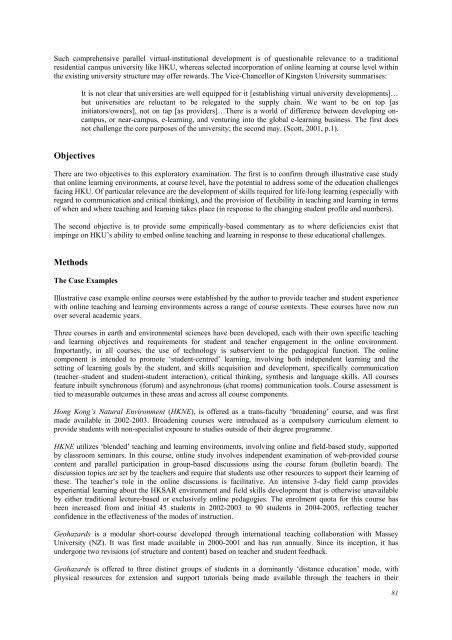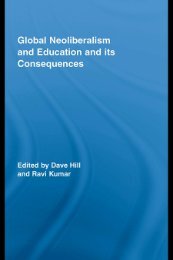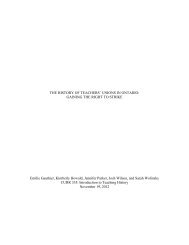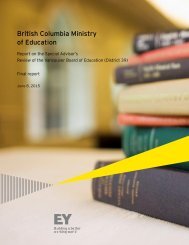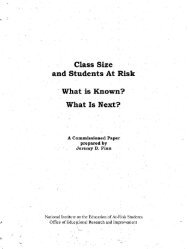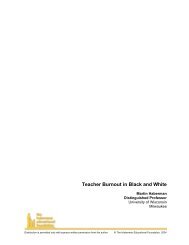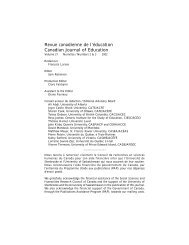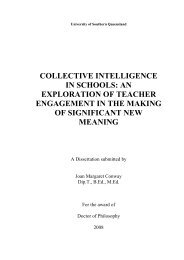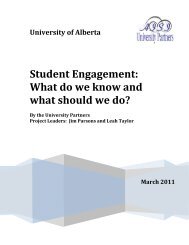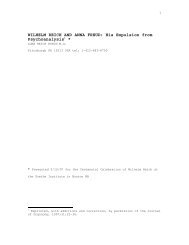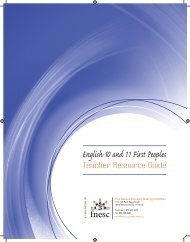October 2006 Volume 9 Number 4
October 2006 Volume 9 Number 4
October 2006 Volume 9 Number 4
You also want an ePaper? Increase the reach of your titles
YUMPU automatically turns print PDFs into web optimized ePapers that Google loves.
Such comprehensive parallel virtual-institutional development is of questionable relevance to a traditional<br />
residential campus university like HKU, whereas selected incorporation of online learning at course level within<br />
the existing university structure may offer rewards. The Vice-Chancellor of Kingston University summarises:<br />
Objectives<br />
It is not clear that universities are well equipped for it [establishing virtual university developments]…<br />
but universities are reluctant to be relegated to the supply chain. We want to be on top [as<br />
initiators/owners], not on tap [as providers]…There is a world of difference between developing oncampus,<br />
or near-campus, e-learning, and venturing into the global e-learning business. The first does<br />
not challenge the core purposes of the university; the second may. (Scott, 2001, p.1).<br />
There are two objectives to this exploratory examination. The first is to confirm through illustrative case study<br />
that online learning environments, at course level, have the potential to address some of the education challenges<br />
facing HKU. Of particular relevance are the development of skills required for life-long learning (especially with<br />
regard to communication and critical thinking), and the provision of flexibility in teaching and learning in terms<br />
of when and where teaching and learning takes place (in response to the changing student profile and numbers).<br />
The second objective is to provide some empirically-based commentary as to where deficiencies exist that<br />
impinge on HKU’s ability to embed online teaching and learning in response to these educational challenges.<br />
Methods<br />
The Case Examples<br />
Illustrative case example online courses were established by the author to provide teacher and student experience<br />
with online teaching and learning environments across a range of course contexts. These courses have now run<br />
over several academic years.<br />
Three courses in earth and environmental sciences have been developed, each with their own specific teaching<br />
and learning objectives and requirements for student and teacher engagement in the online environment.<br />
Importantly, in all courses, the use of technology is subservient to the pedagogical function. The online<br />
component is intended to promote ‘student-centred’ learning, involving both independent learning and the<br />
setting of learning goals by the student, and skills acquisition and development, specifically communication<br />
(teacher–student and student-student interaction), critical thinking, synthesis and language skills. All courses<br />
feature inbuilt synchronous (forum) and asynchronous (chat rooms) communication tools. Course assessment is<br />
tied to measurable outcomes in these areas and across all course components.<br />
Hong Kong’s Natural Environment (HKNE), is offered as a trans-faculty ‘broadening’ course, and was first<br />
made available in 2002-2003. Broadening courses were introduced as a compulsory curriculum element to<br />
provide students with non-specialist exposure to studies outside of their degree programme.<br />
HKNE utilizes ‘blended’ teaching and learning environments, involving online and field-based study, supported<br />
by classroom seminars. In this course, online study involves independent examination of web-provided course<br />
content and parallel participation in group-based discussions using the course forum (bulletin board). The<br />
discussion topics are set by the teachers and require that students use other resources to support their learning of<br />
these. The teacher’s role in the online discussions is facilitative. An intensive 3-day field camp provides<br />
experiential learning about the HKSAR environment and field skills development that is otherwise unavailable<br />
by either traditional lecture-based or exclusively online pedagogies. The enrolment quota for this course has<br />
been increased from and initial 45 students in 2002-2003 to 90 students in 2004-2005, reflecting teacher<br />
confidence in the effectiveness of the modes of instruction.<br />
Geohazards is a modular short-course developed through international teaching collaboration with Massey<br />
University (NZ). It was first made available in 2000-2001 and has run annually. Since its inception, it has<br />
undergone two revisions (of structure and content) based on teacher and student feedback.<br />
Geohazards is offered to three distinct groups of students in a dominantly ‘distance education’ mode, with<br />
physical resources for extension and support tutorials being made available through the teachers in their<br />
81


